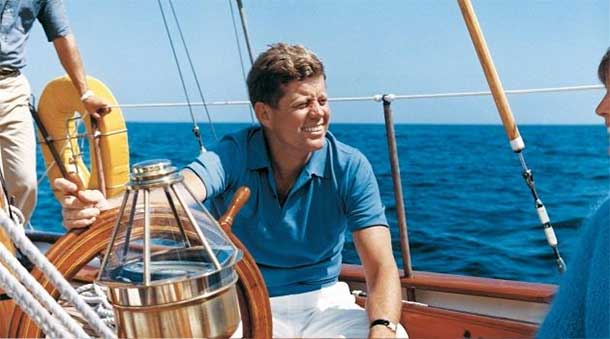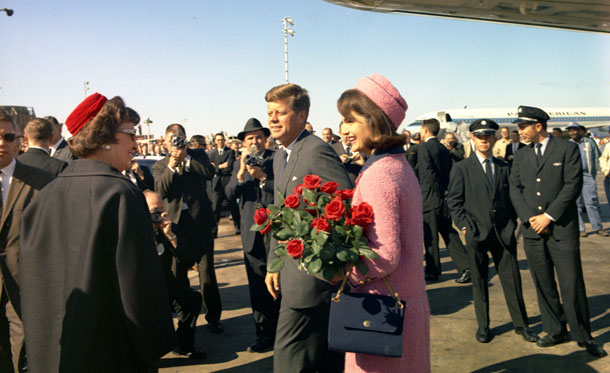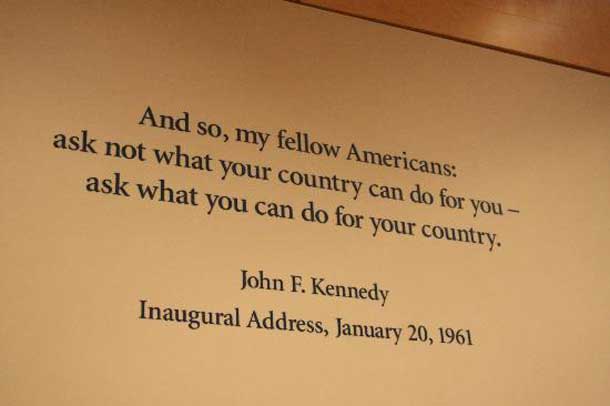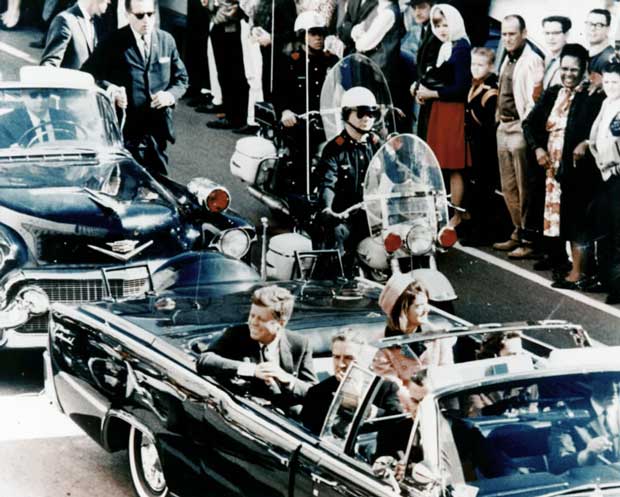
This Saturday, November 22nd, will mark the day President John Fitzgerald Kennedy was brought down by an assassin in Texas. Kennedy and his wife Jackie were as clearly vulnerable as two white tailed deer in the sight-lines of whoever pulled the trigger.
A half century ago heading to high school that morning I literally had a lilt in my step.
The predominance of the day before was my rather special sixteenth birthday.
My parents surprised me with a new pair of Converse All-stars. An athletic version of sneakers the kind John Havlicek wore for the Boston Celtics. I’d packed them in a gym bag with a fresh towel. I set away early anticipating a morning basketball practice. Outside the weather colder than usual.
A lack of snow. A photo would echo Halloween stepping across our frozen soccer field with rain patches frozen solid. Though one’s footfall might smash through a larger setting of ice chilled hollow in strata as the temperatures dipped. The sound was loud as ghostly thin sheets crushed noisily. Attending high school classes what was to come was unthinkable to anyone.
The paradox beginning with our cheerful practice quickly spiralling down into a gut-wrenching day. By the time our initial classes were over John Fitzgerald Kennedy and his wife, Jacqueline, had left a fund raising breakfast in Ft Worth.

They were photographed beneath a marquee Texas sign with the words: Where The West Began. She was demurely dressed in a raspberry Channel suit. Jackie remembered being a recipient of a bouquet of red roses.
Jacqueline thought it quite unique.
Particularly in the Lone Star state where traditional yellow roses were normally presented.
The press, and photographers, were frequently observed sharing the Kennedy’s joy. It marked a rare time Jackie had been on any political rally.
That week was their Thanksgiving Holiday, originating in a Proclamation by Abe Lincoln exactly a hundred years before in 1863.
So many things inspired the buoyant enthusiasm they exuded before taking the eight minute plane trip to Dallas.
They were described as a couple from Camelot.
Virtually a story book legend emerging within the vigour they impelled as crusaders for a New Frontier in global issues and the beautiful persuasion they shared wherever they were. It was later reported JFK had already had Jackie’s Christmas gifts packaged and ready for their Yuletide season back at the White House.
With people everywhere wanting to be in their presence, would many in our town have known the President was in nearby Duluth supporting a fellow Democrat’s campaign only a time before?
John Kennedy was politically infatuated in making North America a better place, a partner in foreign issues throughout the world. In becoming the youngest US President at age 46 he was also breaking a tremendous former barrier being elected as the first Roman Catholic to serve in America’s highest office. When inaugurated in January of 1961 the Kennedys surely embodied the classic notion, “Truth makes that person shine on ones that speak, and own, it.”
I like as well Meryl Streep’s current comment how we, as nations today, as workers of the world would do well “To integrate what you believe into every single area of your life. Take your real heart to work.”
As a Presidential navigator Kennedy sought a new methods negotiating a strident newborn agenda in issues like Civil Rights while straddling elements of the Cold War and developing global programs like the Peace Corps.
JFK was such a complex charismatic yet mythical man. Almost ethereal in his speeches.
Though also down to earth in the way he searched for an egalitarian approach to right wrongs.
As one from New England he slipped through the dunes at Cape Cod, in his stove pipe trousers wearing his penny loafers with a wool sweater knotted over his shoulders, as he often walked, took strolls there, pausing to look across water. Dreaming of programs and ideas to come. He admired nature. Worked on the future of the environment with biologist Rachel Carson. Kennedy, and Mrs. Kennedy, loved the beauty of the Arts.
Theirs became the first Presidential Office to summon poet Robert Frost and cellist Pablo Casals into performing at their Inauguration. He valued learning, research and educational formats of all sorts. So when the crushing wire stories aired of Kennedy’s devastating demise, as he clung to his last hopes, two neighbouring nations: the U.S.A. along with Canada, urgently listened for further details.
The clocks ticked sadly, seemingly so slowly along.
Before it was the familiar newscaster Walter Cronkite who’s tempered task, in a trembling voice, finally came on LIVE black and white TV to announce the death of a President.
Those who spoke of their whereabouts were:
Writer John Steinbeck in Warsaw. He was overwhelmed with the outright grief a foreign country displayed in grieving, sobbing, hugging each other, where many did not talk English.
Many who would never have welcomed JFK to their country.
Having lunch, in Thunder Bay, with Terry O’Malley a member of Canada’s 1960’s Olympic Hockey Team, coached by Father Bauer, O’ Malley was entering an airport with teammate Marshall Johnston when they heard of Kennedy’s fate. “It was something likely not to be seen again,” O’Malley said. “An entire airport was so quiet. So reverential. The lack of conversations, the silence and inertia of passengers, the deadness in sound was just eerie. We’d never experienced that before”.
A colleague, this past week, talking of her family going to Dallas to see Dealy Plaza knowing this historic year will forever be etched as the 50th following the supreme sacrifice Kennedy became crusading his passion for the Democratic ticket. “It was chilling”, she recalled. “Also a surreal feeling in looking all around. The total aura, in the history books, of what occurred there”.
In my subsequent travels graduating from high school I came across JFK in many locations.
At an exhibit of his 1960’s Campaign Tour and Speech in San Francisco at the Cow Palace.Well before the Beatles were in North America.
Along Vancouver’s Pacific waterfront. Kennedy loved the ocean, coastlines and Canada as the US’s closest ally along with Britain.
In Montreal along the St. Lawrence Seaway where Lester Pearson and Kennedy would orchestrate their talks.
In Chicago where Kennedy toured fairly often. The mid-west was definitely a part of his New Deal strategies for so many ventures ongoing. **At the Union Oyster House in Boston. A classic New England Eatery where so many former 1776 American Revolutionaries paused to quaff their thirst and share a meal in conversation of what would be.Kennedy’s seating booth is still marked with a plaque. It is cozy. Intimate. And so benign.
Along the coast of Cape Cod and out to Nantucket Island where Kennedy would host world dignitaries.
There are many places, many routes along the shore–and out in the drifting tides–where locals will inform you of JFK’s lifelong fascination with sailing. Water. The sea. Mankind’s beginnings and return to the element of water. Its therapy. Its beauty. Its inherent place in our lives.
And later, as I travelled through Germany, on the way to Denmark, as a student and carrying a copy of JFK’s Berlin Speech in a vest pocket.
In 1979 being able to see the Opening of the JFK Museum and Library in Dorchester. President Jimmy Carter Officially opened it after years of unbelievable architectural efforts by the renowned I M Pei.
In junction with Kennedy’s wishes it was built on a recycled landfill site with Kennedy’s Cape Cod boat still resting on an embankment. Now, forever in dry docks. Juxtaposed to a scene looking across a channel of water to the skyline of Boston. Perhaps historian Doris Kearns Goodwin wrote one of the ultimate pieces about Kennedy. She said, as a freshman in College, ”President Kennedy offered an excitement.
A fascinating, gifted vision of one who saw what others could not see. Look at the Peace Corps. It was an adventure to travel to other countries, like Africa, for young people. Helping your fellow man in learning and reading. And with medicines giving them a fresh grasp on their lives. It was virtually an enthralling time capsule in history. He taught everyone what a viable tool Education might sincerely stand for. In my own education John F. Kennedy was the ultimate lamp-holder and beacon to pursuing a scholarship in the United States, and Europe, before completing my schooling at the University of Toronto.

JFK’s Inaugural Speech invited all youth to be introspective, and, “Ask not what your country can do for you, ask what you can do for your country”, which rings as true as a seminole call today as that same day Kennedy had poet Robert Frost recite his classic, inspirational, composition: The Gift Outright. Besides, Kennedy’s kind of raison d’etre interpreted through Emerson’s line, “Find your life’s total journey in every step”.
Lastly when JFK spoke at the Berlin Wall, in the era of the Cold War, he implored the political tyrants of this world to tear down barriers. ”We have never needed to build a wall to keep freedom and free people in our nation. Though we realize true Freedom has difficulties. In many places around the globe.”
“However,” John Fitzgerald Kennedy reasoned, “Democracy– though not perfect–will bring a its fortune and a more peaceful form of humanity when given the legacy of a free ballot. And, a lasting chance to go forward.
Where ever peace is championed by men and women of all races and creeds”.
Ronn Hartviksen

